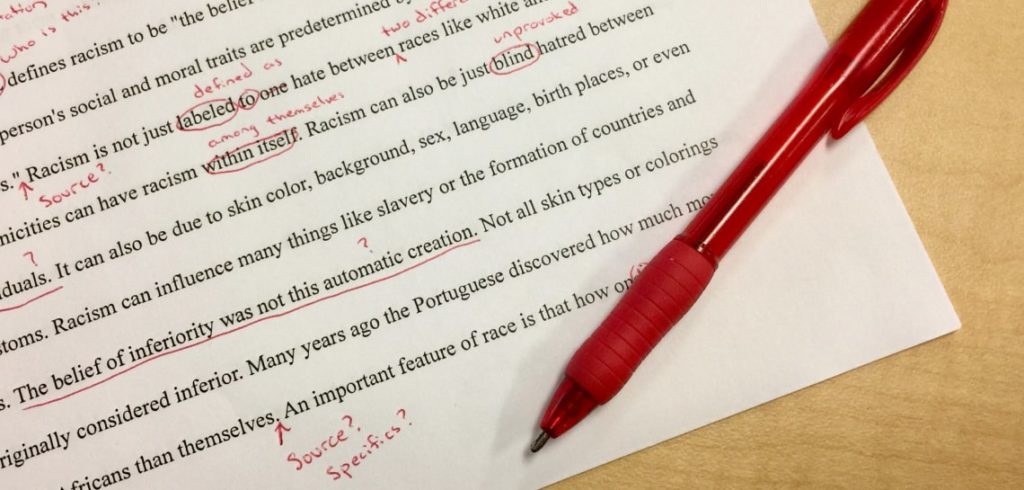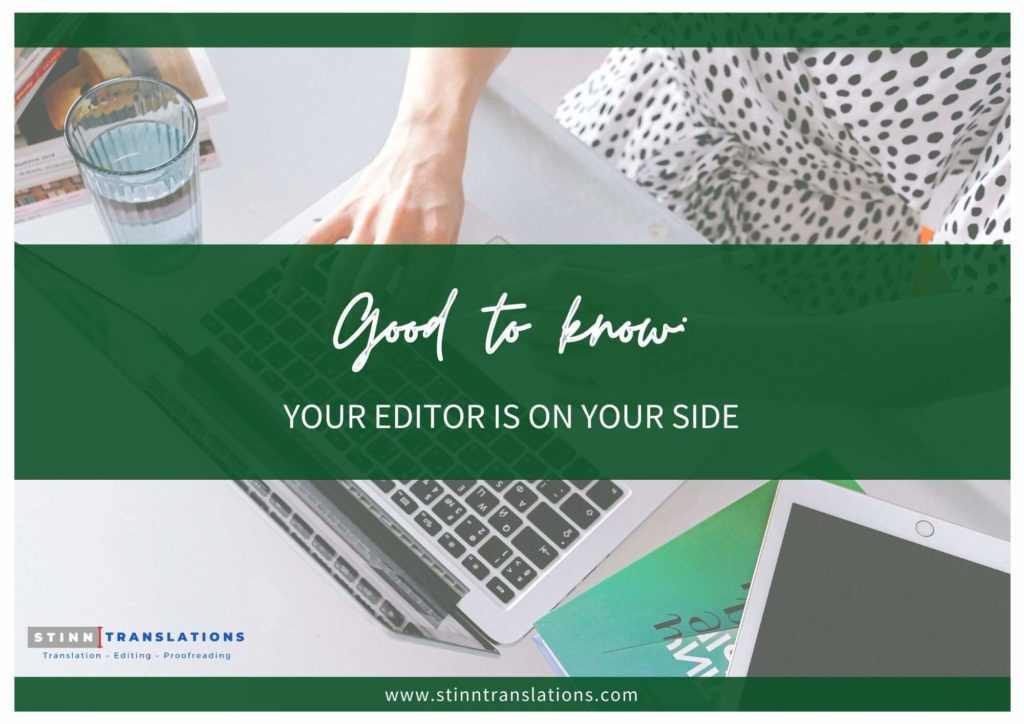Blog:
In other words
Is hiring an academic editor for your thesis unethical?
Every now and then, I get asked questions like “Aren’t you helping students cheat?” and “Don’t students commit academic fraud by hiring you?” when I talk to others about my freelance work. I understand how this subject can cause controversy, especially in light of the many infamous plagiarism and academic fraud scandals in the news.
So, I’ve decided to write this article to clarify a few key points around the question of whether it is unethical to have your thesis professionally proofread or edited.
The short answer is:
It is perfectly ethical to hire a professional academic editor to check your thesis. (Whether your supervisor and your university policy allow it is another question, which we will get to in a second.)
Notice how I emphasized the word “professional” there? That is because the editor needs to understand and respect current editing and university standards that outline the level of intervention permissible.
The Chartered Institute of Editing and Proofreading (CIEP) is a British non-profit organization that promotes excellence in English language editing. It has created a Code of Practice that outlines professional editorial standards. As a member, I am professionally and ethically bound to decline any client requests that breach the limitations of those standards.
With that out of the way, let’s look at a few key points regarding academic editing:
Your thesis demonstrates your critical thinking and research skills, not your immaculate English writing abilities.

It goes without saying that if you’re taking a language or communication class, you should not hire an editor or proofreader to correct your coursework. In that case, you are evaluated based on your language competencies, and any attempt to have someone else do your work for you is considered academic fraud.
However, if you are conducting research or writing a thesis or an article, the focus generally goes beyond language skills.
Your thesis or dissertation demonstrates your ability to independently review literature, conduct research, and interpret your findings in the broader context of your topic.
The reader (i.e., your supervising committee) is primarily interested in your research and critical thinking skills, so you want to make sure that you get your message across as clearly and as competently as possible.
This applies in particular to those whose first language isn’t English. If you are struggling to clarify a point due to a language barrier, having an editor help you with that will greatly improve the reading experience for your audience. Not to mention, you can avoid creating misunderstandings that can have anywhere from embarrassing to disastrous consequences.
What many people don’t know is that supervisors frequently accept—and even strongly advise—that their students get help from a third party to check their work. (I will go into more detail on that shortly.)
Also, most academic journals request that researchers have their work professionally edited or proofread before they submit it for peer review. This ensures that the reviewers can focus on the content (i.e., the contribution to the research community) without getting distracted by typos, wordy segments, and ambiguous language.
Researchers and professors often send their own manuscripts to professional editors before submitting them to a journal for peer review.

A professional editor can help you formulate your ideas more clearly and gives you the opportunity to improve your academic writing. Consider editorial feedback not as criticism but as a chance to learn to communicate more purposefully and effectively in your future texts.

Here’s what a professional academic editor can (and should!) do:
- Correct language errors (spelling, grammar, punctuation, syntax, word choice, fluidity, and clarity)
- Check the writing for consistency in both academic writing style and format
- Flag segments in the student’s writing that are unclear
- Point out inappropriate words or phrases, e.g., informal or slang terms
- Highlight areas that appear to lack appropriate or correct citation
- Make suggestions relating to the content
As long as your editor respects the limitations of those points above, then commissioning academic proofreading or editing services is not considered cheating.
But here is a crucial point to bear in mind:
The thesis or dissertation you submit to your institution must be your own work.
That means it is your responsibility to communicate your ideas and arguments on paper and to present your research in accordance with your institution’s requirements.
In other words, if you expect someone else (e.g., an editor) to make substantial changes to your academic work to the point where it no longer represents your ideas, then you are crossing the line. And anyone who agrees to provide such a service for you breaches the ethical standards of editing.

Here’s what an academic editor should NOT do:
- Write missing sections or—dare I say it—the entire thesis
- Perform fact-checking tasks
- Carry out research or review any literature
- Heavily alter, rewrite, or rephrase the main ideas or arguments (i.e., perform substantive editing)
- Analyze or interpret data
- Look up citations to ensure correct attribution
- Restructure the entire thesis
Now, let’s return to an important question I raised at the beginning:
Does your university allow you to hire a professional proofreader or editor?
The views on this topic vary considerably between countries, states, and even institutions.
Some universities strictly prohibit students from commissioning any proofreading or editing services for their scholarly work. Other institutions strongly encourage their students to seek third-party help for their academic writing.
Those who allow it usually have guidelines or policies in place for proofreading or editing services. Depending on the institution or publisher, you may also need to acknowledge the proofreader or editor in the appropriate section of your writing.
Make sure to ask your supervisor whether—and to what extent—proofreading or editing by a third party is permissible.
Newcastle University states the following on its website:
“If you choose to work with a proofreader (either a professional or a friend), you will need to ensure that their suggestions don’t change your work so much that it’s no longer yours. […] Discuss with your proofreader the type of changes which you feel might be necessary and appropriate, in accordance with Newcastle University’s Assessment Irregularities Procedure and the requirements of the assessment. If you aren’t sure, ask your lecturer or supervisor.”
Lancaster University writes:
“There is no obligation for any student to engage the assistance of a paid proofreader at any stage of study or on any piece of coursework. However, it is acknowledged that certain types of student texts are quite often submitted for proofreading to a third party, and that such assistance is at times actively recommended by supervisors. This is particularly the case for doctoral dissertations, which typically aim for publication standard in their presentation.”
TAKE-HOME MESSAGE
- Check with your supervisor about the university’s rules on third-party proofreading and editing services. Remember that each institution has its own policies on this and that these may differ between universities.
- Choose an editor or proofreader who knows what they’re doing, i.e., hire a professional with experience in editing academic texts and with a solid understanding of the ethical boundaries.
- Do not commission rewriting or ghostwriting services for any of your scholarly work!
- Communicate clearly with your professional about your editorial or proofreading needs, and make sure to forward a copy of your university’s policies to your editor.
- Carefully read through your thesis one last time after your proofreader or editor returns it to you. Clarify any open questions and ensure that there are no misunderstandings. Remember that, in the end, the integrity of your thesis remains your responsibility.
I hope this article has helped you better understand some of the ethical aspects of having your thesis proofread or edited by an academic editor.
Send me an email if you have any questions on this topic that I haven’t answered in this article!
Are you thinking about having your thesis or dissertation professionally proofread or edited?

Christina Stinn is a professional translator, proofreader, and editor with a background in ecological research and experience in publishing peer-reviewed articles in academic journals. She is a Professional Member of the Chartered Institute of Editing and Proofreading (CIEP) and has a M.Sc. degree in International Nature Conservation. So far her work has included fiction and non-fiction books, academic journal articles, and marketing materials in English and German. She loves working with clients who strive to bring their writing to the next level and enjoys taking part in their journey. Find out more
YOU MIGHT ALSO LIKE:



